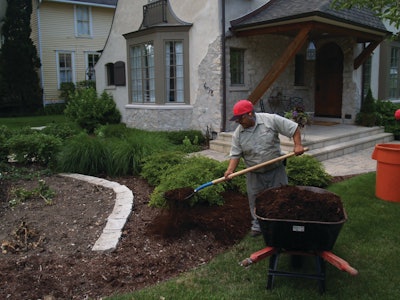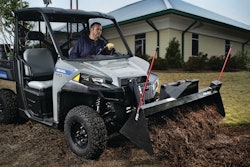
Each season there are a few obstacles that pop up for contractors to overcome. Whether it’s staffing, weather, or turf issues, contractors are forced to take what they get and find a solution that suits their business—and customers. Here are a few areas contractors felt pressure as the 2014 season kicked off, and how they pushed back.
Late spring setback
Contractors in many areas felt the impact of a late spring this year. A long winter, followed by spring’s late start, meant added pressure once it was finally time to get going on maintenance accounts.
“The biggest of the challenges was the late start of the season,” says Russ Marsan of Carpenter & Costin in Rutland, VT. “You still have the same amount of work that needs to get done, you just have less time to do it.”
In the past when Marsan found himself in the same position, he would bring on more staff. Through the years he realized sticking with the same staff numbers and instead focusing on training and increasing work hours was more effective when trying to get back-on-track after a late spring.
“We used to staff heavily and bring in lots of new people in,” explains Marsan. “We found that just because you have a lot of people, doesn’t mean they are performing. There is no notice that there is going to be a late spring and it doesn’t give you a whole lot of time to train people. They just bog you down with payroll instead of helping you get ahead. We usually just do more hours with the well-trained staff we have.”
Equipment for improved efficiency
Marsan also cited equipment that helped him to get the job done quicker without impacting quality. He uses an Exmark walk-behind rotary broom with the lawn sweeper attachment to take care of any debris left after the thaw.
“The lawn attachment gives us the ability to clean up plow damage a lot quicker,” says Marsan. “Some guys are out there with rakes and paddle brooms. The sweepers are 36 and 48 inches across and have exponential power. We can easily clean up any damage that was done by the snowplow with leftover sand and debris. That means a lot, after the 15 feet of snow we got this past winter.”
Marsan is also looking to add mulch blower before next season. With the amount of mulch they have been putting down this year—over 1,500 yards of it—he says the equipment investment is sure to pay off.
“Whatever you can do equipment-wise to help speed yourself up is a good thing,” Marsan says. “Depending on the property, the mulch blower will cut mulch time in half.”
Finding a maintenance and install balance
That time-savings will help in a bag way when trying to balance the satisfaction of maintenance customers and the demands of new construction customers. Contractors are looking for a ways to maintain both the quality of their work and the health of their customer relationships.
“The late spring the last two years has screwed up my entire schedule,” says John Martin of Lawn Enforcement LLC, Lima Center, WI. “When it is somewhat behind normal, it pushes back lawn treatments and pruning. It just crowds everything together and leaves me less time to do landscaping projects.”
Martin—who focuses on lawn treatments, pruning and landscape installations—works hard to communicate the challenges he faces with his customers. He says most are understanding and he has just made sure not to take on more install work than he can handle.
“With the maintenance all bunched together, it doesn’t leave much time for me to do other projects that I can usually get in,” explains Martin. “I haven’t pursued as much install work for that reason, and due to a sciatic nerve issue earlier in the season.”
Water restrictions
Many areas that are seeing droughts from high temps and dry weather are being met with water restrictions. States like Texas, California and New Mexico are dealing with restrictions on watering times and amounts.
Not only can the restrictions make lawn irrigation and planting maintenance difficult, it is also a struggle to keep restrictions straight and water on your schedule. Mandatory outdoor watering schedule restrictions and bans are typically put in place by local or state government, and come in several different structures.
“All the cities have water restrictions and a lot are different timeframes,” says Bert Blair of Yellow Rose Landscape Services in Carrollton, TX. “Some cities are twice a week watering and others are every two weeks. We have been forced to put off a lot of work.”
Workforce weakens
Finding skilled and qualified workers has always been a Green Industry struggle. What can be even more frustrating, is when you find the skilled workforce and are stuck demoting or laying them off due to government regulation of foreign worker eligibility.
“Our work force is mostly Mexican and we are having a harder time getting papers,” says Blair. “When they run out, they are not getting replaced.”
Blair says a lot of the workers who have been with his company for over 10 years. Some are no longer suitable in the role of supervisor because of these restrictions.
“When their Drivers Certificate runs out, they are not getting renewed,” says Blair. “So we are then losing quality supervisors because they cannot drive.”

![Doosan Bobcat Wacker Neuson Stack 2ec Js Pb V6e[1]](https://img.greenindustrypros.com/mindful/acbm/workspaces/default/uploads/2025/12/doosan-bobcat-wacker-neuson-stack2ecjspbv6e1.CPyyz8ubHn.png?auto=format%2Ccompress&bg=fff&fill-color=fff&fit=fill&h=100&q=70&w=100)








![Doosan Bobcat Wacker Neuson Stack 2ec Js Pb V6e[1]](https://img.greenindustrypros.com/mindful/acbm/workspaces/default/uploads/2025/12/doosan-bobcat-wacker-neuson-stack2ecjspbv6e1.CPyyz8ubHn.png?ar=16%3A9&auto=format%2Ccompress&bg=fff&fill-color=fff&fit=fill&h=135&q=70&w=240)








